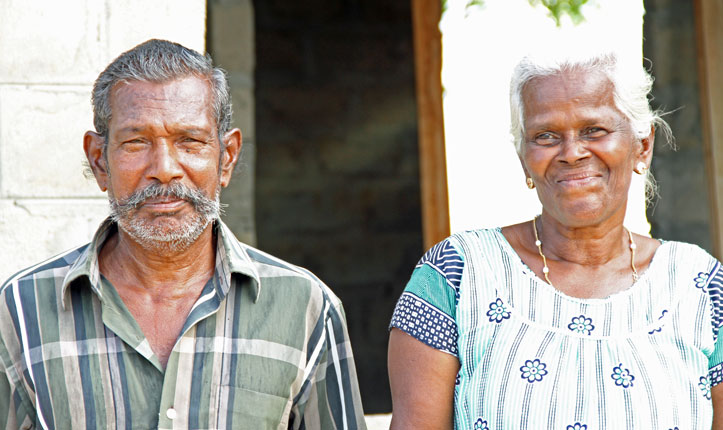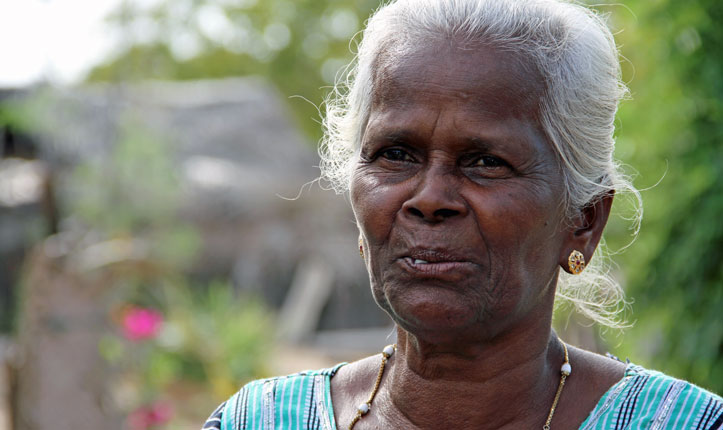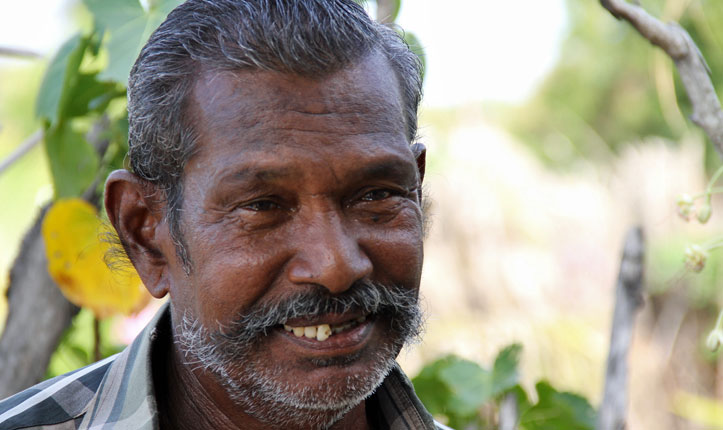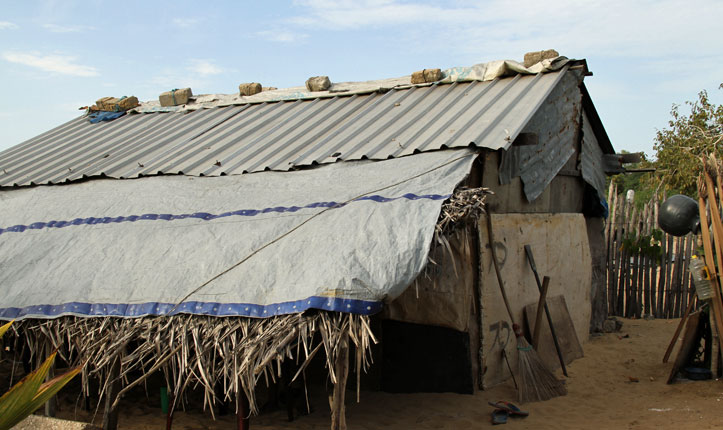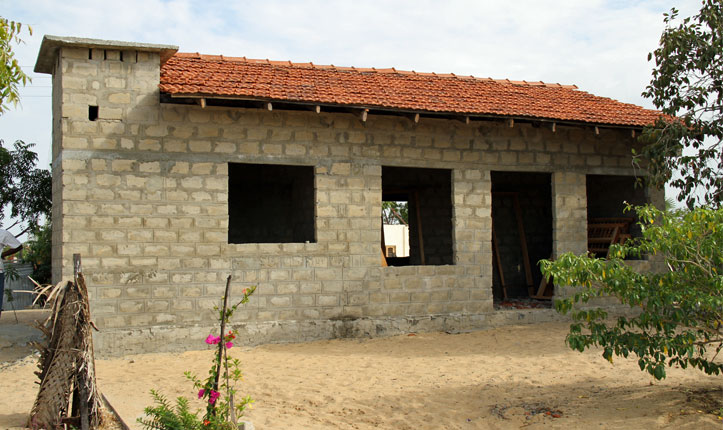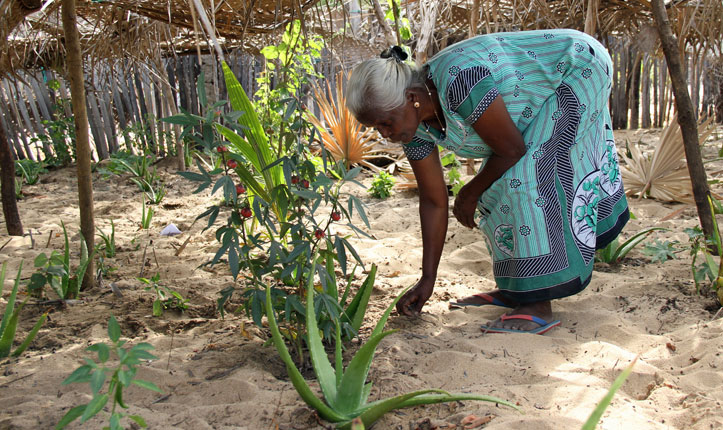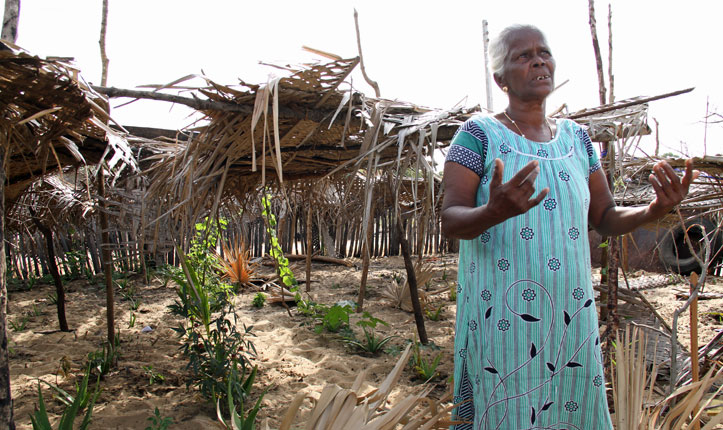A love story transcending hope through the test of time
By Mahieash Johnney & Zafran Packeerally of IFRC/SLRCS Communications in Colombo, Sri Lanka
03/03/2012 – Thalayadi, Sri Lanka: Thalayadi is a village located in the northern tip of Sri Lanka in the Jaffna Peninsula. The village comprises of fishermen and laborers who are in the lowest spectrum of poverty living their day-to-day lives and working hard in order to build a better future.
These people have faced a 30-year-old conflict, a tsunami, floods, cyclones, droughts and severe drinking water shortages in recent times.
Seelavathi & Perumal who comes from two different background calls Thalayadi, home. Seelavathi is a woman born to a Sinhalese family in Rathnapura. Perumal is a man born to a Tamil family and have been living his life in various parts of Jaffna. In the 1960’s, way before the conflict began Selavathi was working in a glass factory in the capital Colombo. Perumal was working for a wealthy businessman in the capital as well. Everyday Seelavathi goes to a local eatery to have her lunch. And this is where she met Perumal, who also comes to the same shop to have his meals. “I saw him every day at that place” says a blushing Seelavathi. “He use to talk to us with the little Sinhala he knew and I found that amazing. Since then I have been with him”
In the late 60’s Perumal took Seelavathi as his lawful wedded wife and both came to Jaffna looking for peace prosperity and a good life in the northern shores of the island. However after few years the war broke out and the area they lived came under the control of the LTTE. Seelavathi was taken to custody by the LTTE for merely being a Sinhalses woman and was charged with spying for Government troops. She was tortured for information on several occasions. Later on she with 5 other women who were captured by the LTTE managed to escape and made her way to Colombo where she lived the next few years under the shelter of her brother. Perumal was still living in Jaffna and was not in a position to come to see her, however managed to send secret messages to her about his safety via several individuals who were able to travel to north most of the time.
In the mid 90’s Perumal managed to bring back his beloved wife Seelavathi back to the Jaffna peninsula where they managed to rebuild a house of their own in the northern tip in a village called Palai, from the money they saved overtime.
Tsunami & the War
After they reunited Seelavathi use to do odd jobs in order to find some money and Perumal was a fishermen. On the early hours on 26th of December 2004, Seelavathi & Perumal witnessed another tragedy as their house got caught to the tsunami waves that hit the shores of Sri Lanka. This was a brutal blow to their lives as they lost every thing they had, including money, jewelry & the house they both built together.
“We saved some money in the 80’s by doing two or three jobs” says Perumal recollecting the past. “Both of us managed to build a very nice house, just a matter of seconds… its all gone”
After the tsunami they relocated themselves to an Internally Displaced Camp, which was in an area under the control of the LTTE. In 2009 when the final battle took place, Seelavathi & Perumal were among the thousands that ran from place to place in the north of Sri Lanka in order to save their lives. During this time Seelavathi managed to get them in to a Government led IDP camp in order to seek shelter and to save their lives from the war that was in its final stages.
Relocation, Rebuilding & Red Cross Support
After the conflict ended the Government of Sri Lanka resettled most of the people living in IDP camps. Seelavathi & Perumal received a plot of land in the village they currently live in called Thalayadi. Both of them managed to build a hut from what ever they can and have been living in this hut for over 1-½ years.
In the latter part of 2011 the Sri Lanka Red Cross Society (SLRCS) supported by the International Federation of Red Cross & Red Crescent Societies (IFRC) rolled out the northern phase of the Post Conflict Recovery Programme in Jaffna. Seelavathi got selected to receive benefits from the programme and was handed the first installment to build the foundation for their new house and currently have completed work until the roof. She now only has to place windows and do the final touches to the house.
During the first quarter of 2010, with the gradual relaxing of access restriction to the Northern region, the SLRCS and the RC Movement partners have developed an integrated programme to support the return and recovery of the IDPs now known as the Post Conflict Recovery Programme (PCRP). The programme is primarily in support of people who have been displaced due to the conflict and are either still displaced or in the process of resettlement.
Similarly to the post Tsunami Community Recovery and Reconstruction Partnership the so called Red Cross Post Conflict Recovery and Reconstruction Programme will support the peoples process of reconstructing their homes by providing cash grants, grants for reconstruction of community infrastructure, technical support and community mobilization in the areas of livelihood, health and care, disaster preparedness and hygiene promotion.
The programme is carried out in partnership with German Red Cross and IFRC supported by Japenese Red Cross Society, Australian Red Cross, UAE Red Crescent and South Korean Red Cross in close coordination with Government Authorities.
In a first step it will assist up to 5,000 families including support to host families and communities.
The basis of primary target population for the programme is Kilinochchi, Mulativu and Mannar districts as well as conflict-affected areas of Vavuniya, Trincomalee, Jaffna, Anuradhapura and Polonnaruwa districts.
Livelihood Support
Another component of the PCRP Programme is to provide livelihood support to people so that they can earn and live a dignifying life without being a burden to the society.
Seelavathi & Perumal also qualified for this and received a sum of 20,000 Sri Lanka Rupees to start what ever that is feasible for them to do in order to earn some living.
With this money Seelvathi bought several Aloe Vera plants and few vegetable plants like Okra, chilies & fruits like King coconuts, & calamondin orange to start a vegetable garden.
Currently she has achieved much success with the garden. “The Sri Lanka Army is now buying the aloe vera I’ve planted for 50 rupees a piece. They have agreed to buy my whole crop when they are big. We find enough money for us to live and save a little by selling vegetables.”
“The whole idea of this programme is to make the most vulnerable people, and make them people who are able,” says Dr. Mahesh Gunasekara who is the Senior Coordinator for the PCRP Programme. “We do not stop after we help them to build their house, we stick around find them a source of income and get them to be citizens who are able to look after themselves. This is our full package of assistance and thus far it has worked marvelously.”
The Red Cross Post Conflict Recovery Programme has managed to save lives and change minds of the most vulnerable people who are living in dire conditions in the former war zones of Sri Lanka. As of now one third of the work is complete and the programme aims to forge towards new communities who need assistance in rebuilding their lives.
If you want more information please visit our webpage www.redcross.lk/idp
Or if you want to make a donation to the IDP Programme please visit our Donation page and make a contribution to the IDP Programme
Pictures by Mahieash Johnney – On Twitter
